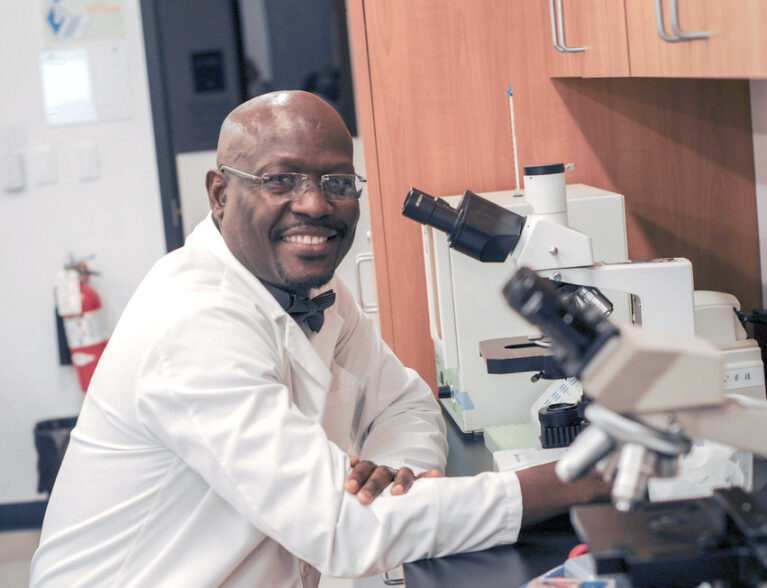
Even though it sounds a little amorphous, chronic fatigue syndrome – now called myalgic encephalomyelitis/chronic fatigue syndrome (ME/CFS) in the medical community – is all too real for hundreds of thousands or even millions of Americans.
As recently as 2015, when the Atlantic magazine ran an article entitled “The Tragic Neglect of Chronic Fatigue Syndrome,” patients were being told that the illness was psychosomatic.
It was also around that time that patients started to demand that they be listened to and acknowledged.
In response, “the National Academy of Medicine created criteria for the diagnosis of ME/CFS that included malaise, fatigue and cognitive dependence,” said Dr. Michael Weir, director of the Biomedical Science program at Keiser University’s Port St. Lucie campus. “That was the beginning of a new day for the syndrome.”
The Open Medicine Foundation (OMF) is a nonprofit that has raised more than $50 million since 2012 to fund open collaborative research to study, diagnose, treat and cure complex diseases. Its six collaborative research centers (CRCs), located in the United States, Sweden, Canada and Australia, are currently studying ME/CFS, building a repository of data about the diseases to be used to develop diagnostic technologies, understand the molecular basis of the diseases, and uncover effective diagnostic tools and treatment.
In February 2024, NPR reported the results of a study that was launched by the National Institutes of Health in 2016 but was disrupted by the pandemic, causing delays in reporting findings until early this year.
The authors of that study concluded that ME/CFS is primarily a brain disorder, probably brought on by immune dysfunction and changes in the gut microbiome.
With a nod toward future possible treatments, the NIH team suggests a type of cancer drug called immune checkpoint inhibitors as one option that could be studied for ME/CFS.
For now, coping with the syndrome remains difficult. “The life span of the average person living with ME/CFS is 55,” says Dr. Weir. “Eighty-five percent of sufferers are women and 75 percent of all those living with the disease are too compromised to work. Some people commit suicide because their quality of life is so bad.”
He adds that although the most common age group is 20-50, children can also get it.
Mayo Clinic says the cause of ME/CFS is still unknown, although there are many unproven theories, including the possibility that a change in the immune system or the way the body responds to an infection or stress is the culprit. It’s a complicated disorder that causes extreme fatigue that lasts for at least six months. Symptoms worsen with physical or mental activity but don’t fully improve with rest.
There’s no single test to confirm a diagnosis. Often, patients need a variety of medical tests to rule out other health problems that have similar symptoms. Treatment focuses on easing symptoms.
Dr. Weir adds that although some symptoms mirror those attributed to long COVID, there are differences. “While most people struggling with long Covid have decreased smell and hair loss, that’s not the case for ME/CFS victims.”
According to the Centers for Disease Control, among the many possible symptoms are:
- Tender lymph nodes in the neck or armpits.
- A sore throat that happens often.
- Digestive issues, like irritable bowel syndrome.
- Chills and night sweats.
- Allergies and sensitivities to foods, odors, chemicals, light or noise.
- Muscle weakness.
- Shortness of breath.
- Irregular heartbeat.
The World Health Organization classifies the syndrome as a neurological disease.
Dr. Weir says there is no known way to prevent ME/CFS, nor is there a cure or approved treatment. “Symptoms are treated individually, with things that run the gamut from scrips to fluids to compression hose, depending on what is being treated.”
Dr. Michael Weir earned a B.S. in Pre-Med/Biology in 1985 from Saint Augustine’s University in Raleigh, N.C., and an M.S. in biological sciences with a concentration in biotechnology from the University of Massachusetts-Lowell in 1989. After serving as a research associate at Massachusetts General and Brigham and Women’s hospitals in Boston for one year, he was admitted to medical school at New York Medical College in 1990 and graduated in 1995 with an M.D., followed by a four-year residency in obstetrics and gynecology at Bronx-Lebanon Hospital Center in New York. After his residency. Dr. Weir entered the world of academia to help develop future biomedical healthcare professionals.



